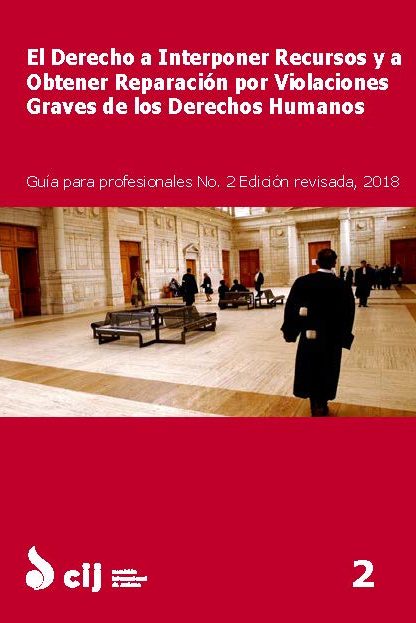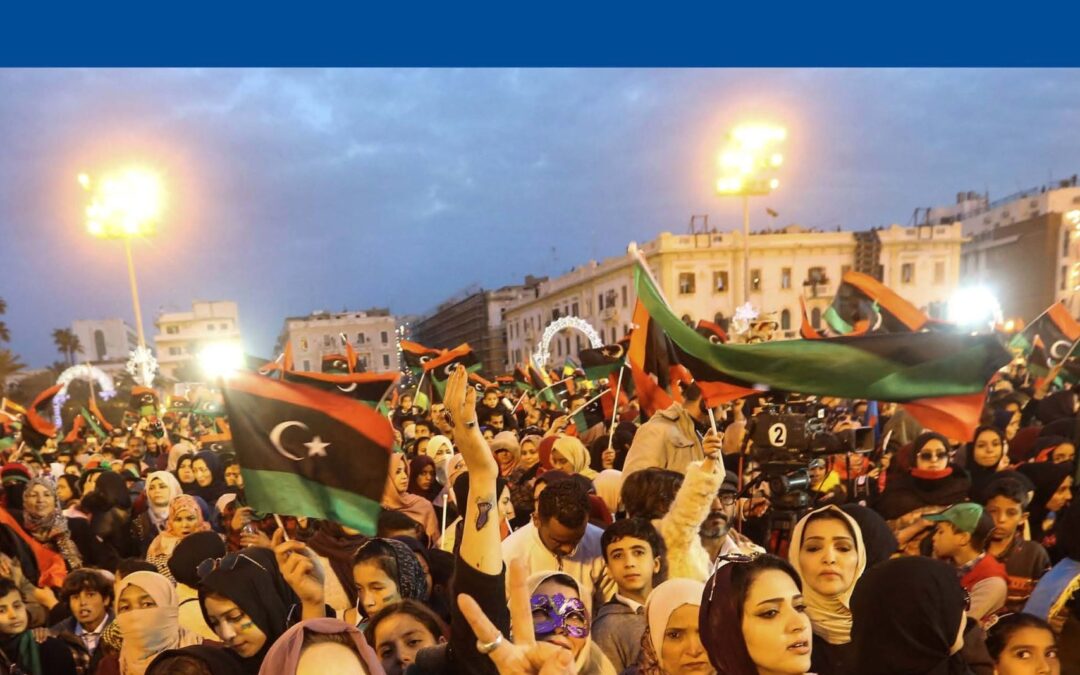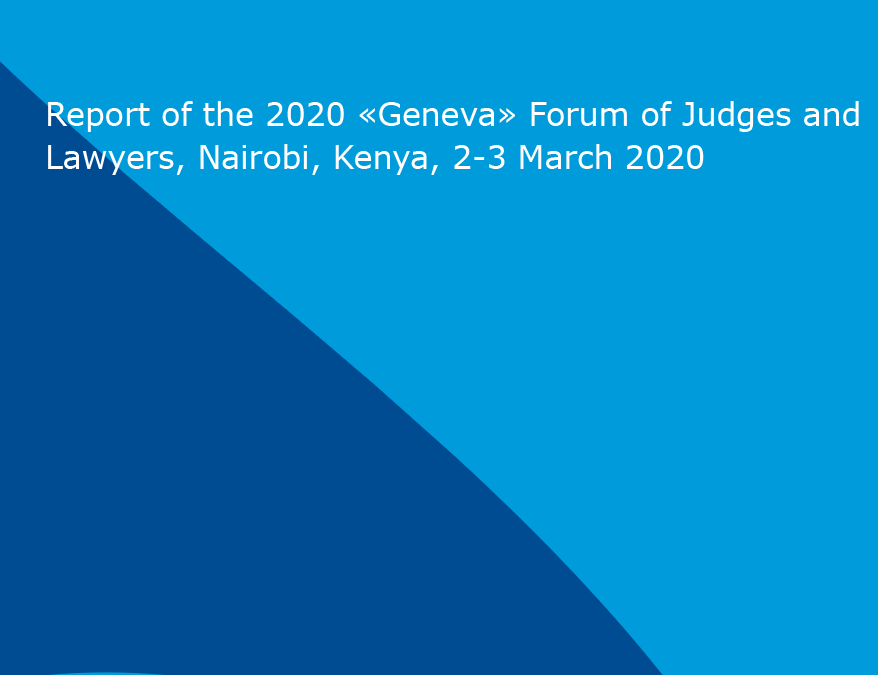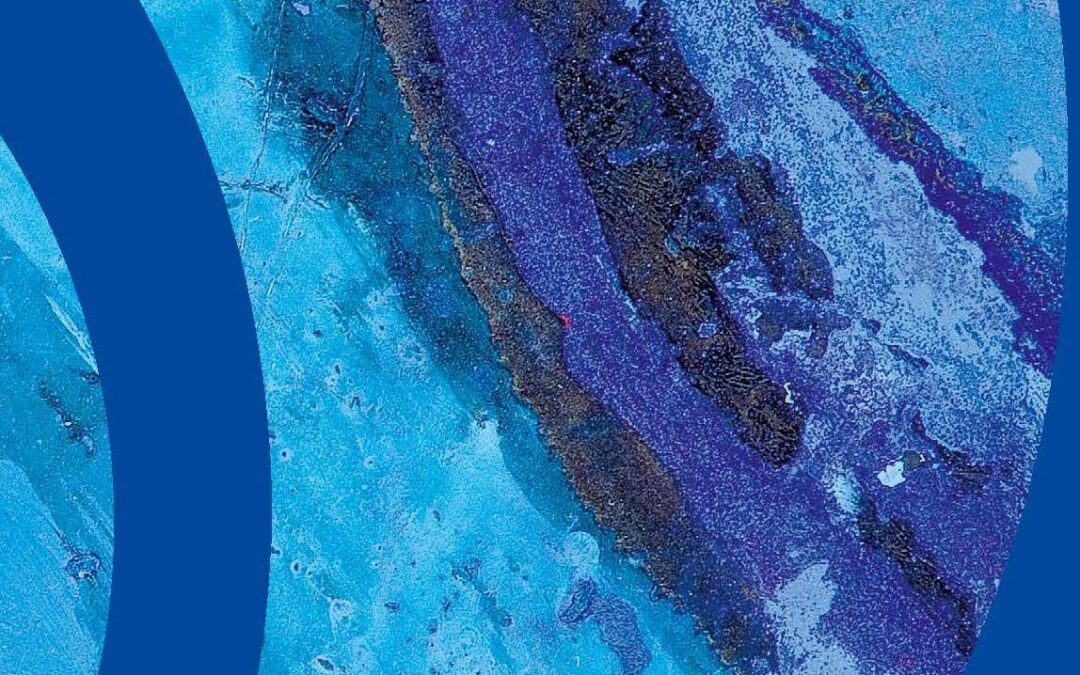
Jul 17, 2020
La Guía para Profesionales No. 2 “El derecho a interponer recursos y a obtener reparación por violaciones graves de los derechos humanos”, en su versión actualizada, describe los estándares internacionales en materia del derecho a interponer recursos y a obtener reparación en los casos de violaciones graves a los derechos humanos.
La Guía está dirigida a profesionales que necesiten conocer los estándares internacionales relevantes en la materia para fortalecer su trabajo legal, de incidencia, social o de otro tipo.
Entre las novedades de la versión revisada de esta Guía, se destaca la actualización de las nociones de “víctimas colectivas”, “derechos colectivos” y los derechos de “grupos de individuos”. De igual forma, se incluyen referencias al trabajo del Comité para la Eliminación de la Discriminación contra la Mujer y del Comité de los Derechos del Niño. Igualmente, la Guía contiene información actualizada sobre el tema de violencia de género.
Esta Guía está compuesta por 9 capítulos. En el Capítulo 1 se analiza el deber general del Estado de respetar, proteger, garantizar y promover los derechos humanos, especialmente en lo relativo a las consecuencias generales derivadas de las violaciones graves a los derechos humanos. En el Capítulo 2 se expone el tema de quiénes tienen derecho a obtener reparación. Posteriormente, de los Capítulos 3 a 5, se abordan los asuntos legales relacionados con el derecho a un recurso efectivo, el derecho a la verdad, y el derecho a una investigación rápida, exhaustiva, independiente e imparcial.
Por su parte, el Capítulo 6, se ocupa de las consecuencias de las violaciones manifiestas de derechos humanos, es decir, el deber que tiene el Estado de poner fin a una violación que se esté produciendo, y garantizar que no se cometerán más violaciones. Además, el Capítulo 7 realiza un análisis sobre distintas modalidades de reparación: la restitución, la indemnización, la rehabilitación, la satisfacción. El Capítulo 8, aborda la obligación de investigar y sancionar. Y por último, el Capítulo 9 analiza factores frecuentes de impunidad, como los juicios ante los tribunales militares, las amnistías y la prescripción para crímenes bajo el derecho internacional.
Universal-PG 2 updated-Publications-Practitioners’ Guide Series-2020-SPA (la guía, en PDF)

Jul 9, 2020
In a briefing paper published today, the ICJ called on the Libyan authorities to act to amend the country’s transitional justice law in order to allow it to serve its purpose in facilitating accountability, truth and reparation for past and ongoing gross human rights violations committed in the country.
To date, transitional justice in Libya has not been implemented due to the entrenched political instability and ongoing armed conflict.
International support for the transitional justice process has recently been expressed in the Berlin Conference Conclusions on 19 January 2020, endorsed by UN Security Council Resolution 2510 (2020).
“Reconciliation in the country won’t be achieved unless accountability for gross human rights violations and justice to victims are guaranteed,” said Said Benarbia, the ICJ’s MENA Programme Director.
“To achieve these objectives, the transitional justice framework must be fully reviewed to conform to Libya’s obligations under international law.”
This framework, particularly Law No. 29 of 2013, fails to provide for jurisdiction over crimes under international law, including enforced disappearance, rape and other forms of sexual violence, war crimes and crimes against humanity. It also fails to ensure that legal measures historically used by States to foster impunity – such as amnesties, immunities and statutory limitations – cannot apply to prosecutions for these crimes.
The independence, impartiality and competence of the Fact-Finding and Reconciliation Commission, established under the Law to conduct fact-finding into gross human rights violations and award reparations to victims, is not adequately guaranteed. The scope of its mandate is not sufficiently clear and its investigative powers are too weak to serve its purpose.
Law No. 29 of 2013 does not also adequately ensure the right to truth or lay the foundations for the public participation in, and the transparency of, the transitional justice process.
The Law also fails to provide for access to effective remedies and full and adequate reparations to victims of gross human rights violations or abuses, and their next of kin.
“Transitional justice in Libya must live up to the expectations of victims and their families,” said Kate Vigneswaran, the ICJ’s MENA Programme Senior Legal Adviser.
“Libyans have the right to know the complete truth regarding all gross human rights violations perpetrated in Libya, and victims must be guaranteed full redress for the harm suffered.”
Contact
Said Benarbia, Director, ICJ Middle East and North Africa Programme, t: +41-22-979-3817; e: said.benarbia(a)icj.org
Kate Vigneswaran, Senior Legal Adviser, ICJ Middle East and North Africa Programme, t: +31-62-489-4664; e: kate.vigneswaran(a)icj.org
Download
Libya-Transitional justice-Publications-Reports-thematic report-2020-ENG (full report, in PDF)
Libya-Transitional justice-Publications-Reports-thematic report-2020-ARA (full report in Arabic, PDF)

Jun 30, 2020
The ICJ has today published a report on customary and informal justice systems, and alternative dispute resolution processes, in the East, Southern and Horn of Africa.
The report is based on discussions at the 10th ICJ “Geneva” Forum of Judges & Lawyers which took place in Nairobi, Kenya, in March 2020.
The ICJ’s Geneva-based Centre for the Independence of Judges and Lawyers, and its Africa Regional Programme, collaborated with the International Development Law Organization (IDLO) to organize the regional Forum, which was convened under the auspices of the Judiciary of Kenya and in cooperation with the ICJ’s national section ICJ Kenya.
The Forum brought together senior judges, lawyers, and other legal experts and practitioners from around the region, from both formal State justice systems and indigenous and other traditional or customary systems, as well as other alternative dispute resolution processes.
Participants exchanged experience and expertise regarding the opportunities for improving access to justice, and methods for mitigating risks that could arise, through constructive engagement with indigenous and other traditional or customary justice systems in the East, Southern and Horn of Africa. The relevance of UN Sustainable Development Goal 16 and global and regional human rights and rule-of-law standards was also highlighted.
The report summarizing discussions at the regional Forum should be read in conjunction with the separately published and periodically updated ICJ publication Indigenous and other Traditional and Customary Justice Systems: Selected International Sources, which compiles relevant treaty provisions, standards, conclusions and recommendations of UN and other expert bodies, as well as the Report of the 8th ICJ Geneva Forum held in 2017 and the Report of the 9th ICJ Geneva Forum held in 2018. Building on her participation in the 2018 Forum, the UN Special Rapporteur on the Rights of Indigenous Peoples devoted her 2019 report to the UN Human Rights Council to the topic of indigenous justice systems.
The Geneva Forum global and regional consultations, the Special Rapporteur’s report and recommendations, and the ICJ’s own research, global experience and expertise, provide a foundation for the development by the ICJ of further legal, policy and practical guidance to be discussed at a conclusory global ICJ “Geneva” Forum on the topic in late 2020, and published before March 2021.
The Geneva Forum is an annual global meeting of senior judges, lawyers, prosecutors and other legal and United Nations experts, convened by the ICJ through its Geneva-based Centre for the Independence of Judges and Lawyers, with the support of the Canton and Republic of Geneva (Switzerland) and other partners.
Each year, participants and the ICJ discuss an issue relevant to the independence and role of judges, lawyers and prosecutors, with a view to developing and disseminating practical guidance for practitioners.
Contact
matt.pollard(a)icj.org
Download
Africa-GvaForum Kenya-Publications-Reports-Seminar or conference reports-2020-ENG

May 11, 2020
The ICJ called today on the Ukrainian authorities to take urgent measures to ensure that lawyers in Ukraine are able to work in an atmosphere free of threat, harassment or any other improper interference.
An ICJ mission report published today, Between the Rock and the Anvil: Lawyers under Attack in Ukraine, documents an alarming level of violence against Ukrainian lawyers relating to their work, and makes recommendations to the Ukrainian authorities to better uphold the security and independence of lawyers, and ensure that they are able to protect human rights.
“While the ICJ notes repeated attempts to the reform the justice system, it is highly alarming that lawyers continue to be subjected to attacks, including murder and physical abuse,” said Temur Shakirov, ICJ Senior Legal Adviser for the Europe and Central Asia Programme.
“Lawyers must be able to work in an atmosphere free of fear of reprisal for their work in defence of their clients, as required by international human rights law and international standards on the role of lawyers,” he added.
The ICJ report finds that the security of lawyers and their ability to protect the rights of their clients are under constant threat in Ukraine.
In particular, lawyers who work on politically sensitive cases or in the conflict zone face risks of attacks and harassment.
Lawyers who are subject to such attacks do not have access to effective legal remedies against the interference with their work. Even in case of killings of lawyers, the perpetrators have not been brought to justice.
The report also analyses the institutional organization and self-governance of the legal profession, the disciplinary procedure, the persecution of lawyers through legal mechanisms and the problems lawyers face in protecting human rights.
The report notes some positive developments in Ukraine, including the independence of the Ukrainian National Bar Association, as an important achievement.
“Despite recent reforms Ukraine has not yet become free from the pattern of having ‘good laws and poor practice’, which often renders the justice system dysfunctional, and undermines reforms,” Shakirov said.
“As it is possible that Ukraine may experience another whirlwind of reforms, the risk of the legislative initiatives which may aim or result in undermining the security and independence of the legal profession remains,” he added.
The report makes comprehensive recommendations for addressing the problems of attacks and harassment of lawyers and taking measures as a matter of urgency. Among the measures, the ICJ recommends measures to ensure that:
- The independence and role of lawyers is respected by all State institutions: the executive, legislative and the judiciary, by all other public authorities including law enforcement authorities, and by all participants in legal proceedings;
- Sufficient staff with adequate professional training and capacity to be able to ensure safety and security in courts is provided;
- Relevant law enforcement agencies investigate promptly and effectively all killings and attacks on lawyers with the aim of identifying those responsible and bringing them to justice in proceedings which fully respect international fair trial standards.
Background:
The report is based on research and analysis of Ukrainian law in light of international law and standards as well as the findings and conclusions of an ICJ mission (2019) to Ukraine to assess the situation of security and independence of lawyers. During the mission, the ICJ met with a range of relevant actors-individual lawyers and legal experts, non-governmental and State representatives, human rights defenders and journalists who cover legal issues.
Download:
Ukraine-Between the rock and the anvil-Publications-Reports-Mission report-2020-ENG (Report in English, PDF)
Ukraine-Lawyers under attack report-News-press releases-2020-UKR (News story in Ukrainian, PDF)
Ukraine-Between the rock and the anvil-Publications-Reports-Mission report-2020-UKR (Report in Ukrainian, PDF)
Ukraine-Between the rock and the anvil-Publications-Reports-Mission report-2020-RUS (Report in Russian, PDF)

Feb 17, 2020
Today the ICJ published a guide on Corporate Accountability for Abuses of Economic, Social & Cultural Rights in Conflict and Transition.
Around the world, businesses frequently operate in areas or regions in which armed conflict, internal disturbances or upheaval, severe authoritarianism, or other crises are either continuing or have recently ceased.
It is now common for societies seeking to move past such periods to employ transitional justice processes and mechanisms in efforts to build constitutional democracies grounded in the rule of law, protection of human rights and the fair administration of justice.
At times businesses are involved, either directly or in complicity with State agents, armed groups or other actors, in human rights violations or abuses, which occur during or after such conflicts or authoritarian settings.
These abuses may be of civil and political rights but they also often implicate economic, social and cultural rights. Failure to properly consider abuses of economic, social and cultural rights in transitional justice processes, including those caused or contributed to by businesses, can render their outcomes less effective and unsustainable.
All transitional justice processes and mechanisms must be grounded in the principles of international law.
This guide therefore sets out the core principles of international human rights law relating to: Transitional Justice; Economic, Social and Cultural Rights and Business and Human Rights, clearly describing how these three sets of principles interact and coalesce.
This guide will therefore be particular useful to transitional justice practitioners in ensuring that the design and implementation of transitional justice processes and mechanisms are fully consistent with international human rights law.
It also provides guidance to businesses in considering how to ensure compliance with international human rights law when they are operating in situations where conflict is occurring, likely to occur or recently has occurred.
In addition, because of their severe vulnerability of children to rights violations in such contexts, the guide includes a specific chapter focuses on corporate accountability for abuses of children’s rights in conflict settings.
The guide draws on examples of best practice throughout and includes case studies and examples from a wide range of countries including: Argentina; Colombia; East-Timor; Mauritius; Myanmar; Liberia; South Africa; Sierra Leone; Uganda and Tunisia.
Read also
The guide is best read with the following ICJ publications:
The ICJ’s Practitioners Guide on The Right to a Remedy and Reparation for Gross Human Rights Violations; the ICJ’s Practitioners Guide on Adjudicating Economic, Social and Cultural Rights at National Level; The ICJ & Child Rights International Network’s Practical Guide for Non-Governmental Organizations on how to use the United Nations Committee on the Rights of the Child’s General Comment No. 16; and the ICJ and UNICEF’s Practical Guide for States on how to implement the United Nations Committee on the Rights of the Child’s General Comment no. 16.
Download
Universal-ESCR accountability guide-Publications-Reports-Thematic report-2020-ENG (the full guide, in PDF)
Universal-ESCR accountability guide summary-Publications-Reports-Thematic report-2020-ENG (the executive summary and overview, in PDF)









